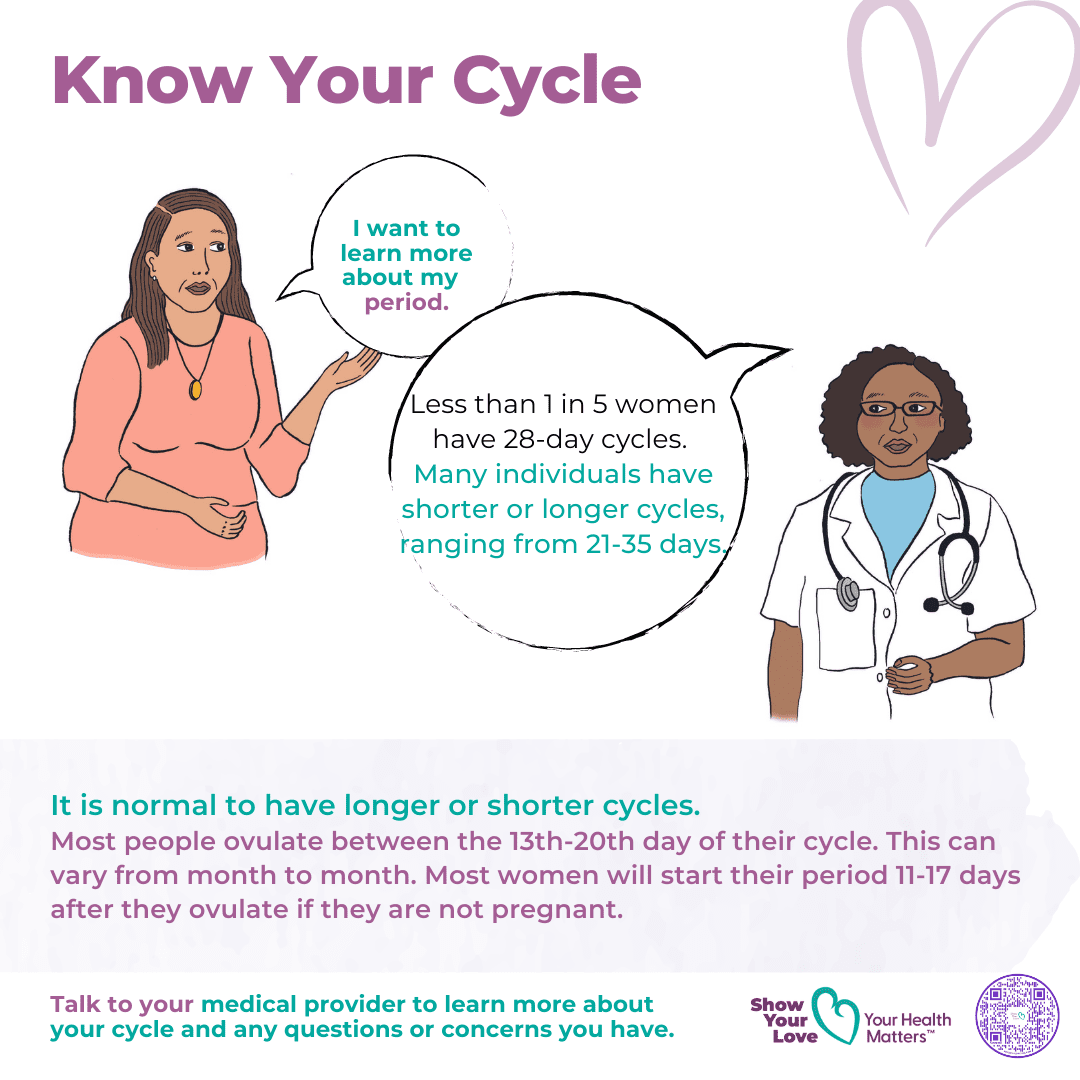Review this patient education one-pager about Cycles & Periods.
Do you know when to expect your period? Is it regular? Keep track of your period and symptoms related to your menstrual cycle. It may not be the sexiest topic, but it is a great way to understand how your body works. Knowing when to expect your period has practical value, since it can help you to make plans for travel or intimacy, but it can also help you understand your health. An irregular period, or one that is unusually long or painful, may be a sign of a bigger health issue. Not sure what is normal and what is not, or how it all works? Learn the monthly cycle basics.
Many women start to track their cycles and understand how they work only when they are thinking of becoming pregnant, but it’s helpful info at all stages of life. If pregnancy is not in your current plan, being aware of your most fertile times can help you reduce the chances of getting pregnant. This is sometimes called Fertility Awareness. Using this method to avoid pregnancy requires lots of self-discipline so it’s a good idea to use another birth control method even if you’re tracking your cycles.
Speak to your health care provider if you are concerned about something, such as your fertility, irregular or very heavy periods, changes in your cycle, and symptoms that are hard to manage.
What biological clock?
Only you know the best time for a pregnancy, and it should be up to you and your partner to decide if and when you’re ready for children. Many people are fertile for many years or even decades before they are emotionally and financially prepared to have a baby. But for planning purposes, it’s helpful to know that both men and women experience changes in their fertility across the lifespan.
Women are the most fertile in their twenties, so that’s when it would be easiest to get pregnant, planned or not. Fertility starts to gradually decrease around age 30, through the decade of the 30’s, and fertility is much lower after age 40. A healthy, fertile 30-year-old woman has about a 20% chance of getting pregnant during any particular cycle. By age 40, chances of conceiving drop to about 5% for each cycle. Men, on the other hand, produce sperm across most of their lifespan. Men experience a gradual decrease in healthy sperm over age 40-45, which means a more difficult time conceiving. There may also be issues with the mechanics of sex for aging men, but they’re able to conceive as long as their parts work. Here is a more detailed explanation of fertility as you age.
While there are many women who have healthy babies in their late thirties and into their forties, it may be more difficult. Here are a few other things to consider:
- Chances for birth defects or chromosomal abnormalities like Downs Syndrome increase with the age of both the female and the male partner
- Miscarriage rates increase with the age of the woman and the age of her male partner
- Chances of placenta previa and placental abruption increase with age
- Certain chronic health conditions, such as diabetes and high blood pressure are more common as women age and could impact the health of a pregnancy
Very Well Family has more information to ponder as you consider delaying pregnancy into your later 30’s and 40’s. Keep in mind that most babies are born healthy, regardless of their parents’ ages.
Below are our favorite fertility and period tracking resources & apps:
Use this online screening tool to learn about your fertility and factors associated with your menstrual cycle and fertility.
Clue, Kindara, Ovia Fertility, and What to Expect Fertility Tracker are good tools to learn about your own fertility, how it changes over time, and how medications, lifestyle, etc., can affect your fertility.
Interested in becoming pregnant? Now or in the future, it is a good idea to talk with a health provider about your goals to become pregnant or not.
This can be a tough subject. Learn more about fertility.
Follow the Period Doctor to learn more about menstruation, fertility, and talking with a provider about pregnancy and caring for YOU.
Everyone deserves to have access to the products they need to manage their period, yet these essential health products are not covered by government grocery assistance programs like WIC and SNAP, and in many states they’re taxed as a luxury item.
People also deserve access to a health care provider to help with menstrual problems.
Check out Period.org. You might like this WUNC podcast episode too!
